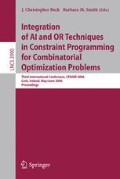Abstract
Real-life management decisions are usually made in uncertain environments, and decision support systems that ignore this uncertainty are unlikely to provide realistic guidance. We show that previous approaches fail to provide appropriate support for reasoning about reliability under uncertainty. We propose a new framework that addresses this issue by allowing logical dependencies between constraints. Reliability is then defined in terms of key constraints called “events”, which are related to other constraints via these dependencies. We illustrate our approach on two problems, contrast it with existing frameworks, and discuss future developments.
Access this chapter
Tax calculation will be finalised at checkout
Purchases are for personal use only
Preview
Unable to display preview. Download preview PDF.
References
Bistarelli, S., Montanari, U., Rossi, F.: Soft constraint logic programming and generalized shortest path problems. Journal of Heuristics, Kluwer (2001)
Fargier, H., Lang, J., Martin-Clouaire, R., Schiex, T.: A constraint satisfaction framework for decision under uncertainty. In: Proc. of the 11th Int. Conf. on Uncertainty in Artificial Intelligence, Montreal, Canada (August 1995)
Kingsman, B.G.: Raw materials purchasing: an operational research approach. Pergamon Press, New York (1985)
de Kok, A.G., Graves, S.C.: Supply chain management: design, coordination and operation. In: Handbook in OR/MS, vol. 11, Elsevier, Amsterdam (2003)
Liu, B., Iwamura, K.: Modelling stochastic decision systems using dependent-chance programming. European Journal of Operational Research 101, 193–203 (1997)
Manandhar, S., Tarim, S.A., Walsh, T.: Scenario-based stochastic constraint programming. In: Proc. of IJCAI-2003, Acapulco, Mexico, pp. 257–262 (2003)
Petit, T., Régin, J.-C., Bessière, C.: Meta-constraints on violations for over-constrained problems. In: Proc. of ICTAI 2000, Vancouver, BC, Canada, November 2000, pp. 358–365. IEEE Computer Society, Los Alamitos (2000)
Porteus, E.L.: Foundations of stochastic inventory theory. Stanford University Press, Stanford, California (2002)
Tarim, S.A., Manandhar, S., Walsh, T.: Stochastic constraint programming: a scenario based approach. Constraints 11, 53–80 (2006)
Author information
Authors and Affiliations
Editor information
Editors and Affiliations
Rights and permissions
Copyright information
© 2006 Springer-Verlag Berlin Heidelberg
About this paper
Cite this paper
Tarim, S.A., Hnich, B., Prestwich, S.D. (2006). Event-Driven Probabilistic Constraint Programming. In: Beck, J.C., Smith, B.M. (eds) Integration of AI and OR Techniques in Constraint Programming for Combinatorial Optimization Problems. CPAIOR 2006. Lecture Notes in Computer Science, vol 3990. Springer, Berlin, Heidelberg. https://doi.org/10.1007/11757375_17
Download citation
DOI: https://doi.org/10.1007/11757375_17
Publisher Name: Springer, Berlin, Heidelberg
Print ISBN: 978-3-540-34306-6
Online ISBN: 978-3-540-34307-3
eBook Packages: Computer ScienceComputer Science (R0)

